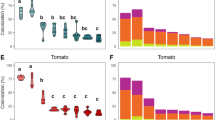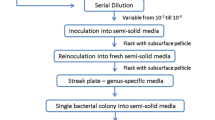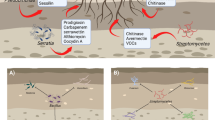Abstract
Ilex paraguariensis St. Hil. (yerba mate) is a native tree to the Atlantic forest of South America, where Argentina is the world’s largest producer. In a previous study, two strains of Bacillus spp. were isolated from I. paraguariensis St. Hil. seedlings and selected for their ability to promote plant growth. To gain a better understand this, a traceability assay was performed to verify the bioinoculant effects of Bacillus spp. on I. paraguariensis St. Hil. seedlings. A manual search for unique genome sequences of B. altitudinis T5S-T4 and 19RS3 strains was performed to develop strain-specific primers. The traceability assay was performed in a nursery with I. paraguariensis St. Hil. seedlings that were inoculated with B. altitudinis T5S-T4, 19RS3, or a combination of both. Growth parameters, including height, number of leaves, neck diameter, and chlorophyll index, were measured every 15 days in the nursery. Fresh and dry weights of the aerial parts, leaves, roots, and leaf area were measured in the laboratory. The substrate DNA was extracted using a commercial kit. B. altitudinis T5S-T4 and 19RS3 were identified in the substrate 14 and 28 days after the first inoculation, respectively, to day 112 of the assay. The bioinoculation effect of the two-strain combination was confirmed by significant increases in growth parameters, including height, neck diameter, chlorophyll index, and wet weight of aerial parts. The designed and synthesized strain-specific primers allowed the monitoring of the colonization and persistence of B. altitudinis T5S-T4 and B. altitudinis 19RS3 on I. paraguariensis St. Hil seedling substrate inoculated under nursery conditions. The properties of B. altitudinis T5S-T4 and 19RS3 in consortium make them excellent candidates for the formulation of bioinoculants for I. paraguariensis St. Hil.









Similar content being viewed by others
Data Availability
The datasets generated during and/or analysed during the current study are available from the corresponding author on reasonable request.
References
Ambreetha S, Balachandar D (2023) SCAR marker: A potential tool for authentication of agriculturally important microorganisms. J Basic Microbiol 63:4–16. https://doi.org/10.1002/jobm.202200419
Amy C, Avice JC, Laval K, Bressan M (2022) Are native phosphate solubilizing bacteria a relevant alternative to mineral fertilizations for crops? Part I. when rhizobacteria meet plant P requirements. Rhizosphere 100476. https://doi.org/10.1002/jobm.202200419
Anriquez AL, Silberman JE, Nuñez JAD, Albanesi AS (2019) Biofertilizers in Argentina. In: Giri B, Prasad R, Wu QS, Varma A (eds) Biofertilizers for sustainable agriculture and environment. Springer, Cham, pp 225–244
Aziz RK, Bartels D, Best AA, DeJongh M, Disz T, Edwards RA, Formsma K, Gerdes S, Glass EM, Kubal M, Meyer F, Olsen GJ, Olson R, Osterman AL, Overbeek RA, McNeil LK, Paarmann D, Paczian T, Parrello B, Pusch GD, Reich C, Stevens R, Vassieva O, Vonstein V, Wilke A, Zagnitko O (2008) The RAST server: Rapid Annotations using Subsystems Technology. BMC Genomics 9:75. https://doi.org/10.1186/1471-2164-9-75
Basu A, Prasad P, Das SN, Kalam S, Sayyed RZ, Reddy MS, El Enshasy H (2021) Plant growth promoting rhizobacteria (PGPR) as green bioinoculants: recent developments, constraints, and prospects. Sustainability 13:1140. https://doi.org/10.3390/su13031140
Bergottini VM, Hervé V, Sosa DA, Otegui MB, Zapata PD, Junier P (2017) Exploring the diversity of the root-associated microbiome of Ilex paraguariensis St. Hil. (yerba mate). Appl Soil Ecol 109:23–31. https://doi.org/10.1016/j.apsoil.2016.09.013
Bikandi J, Millán RS, Rementeria A, Garaizar J (2004) In silico analysis of complete bacterial genomes: PCR, AFLP–PCR and endonuclease restriction. Bioinform 20:798–799. https://doi.org/10.1093/bioinformatics/btg491
Chávez-Luzanía RA, Montoya-Martínez AC, Parra-Cota FI, de los Santos Villalobo S (2022) Pangenomes-identified singletons for designing specific primers to identify bacterial strains in a plant growth-promoting consortium. Mol Biol Rep 49:10489-10498. https://doi.org/10.1007/s11033-022-07927-8
Cochard B, Giroud B, Crovadore J, Chablais R, Arminjon L, Lefort F (2022) Endophytic PGPR from tomato roots: isolation, in vitro characterization and in vivo evaluation of treated tomatoes (Solanum lycopersicum L.). Microorganisms 10:765. https://doi.org/10.3390/microorganisms10040765
Coniglio A, López G, Gualpa J, Molina R, Rosas S, Puente M, Mora V, Cassán F (2020) Desarrollo de marcadores moleculares del tipo SCAR para la identificación de Azospirillum brasilense Az39. Rev Argent Microbiol 52:50–60. https://doi.org/10.1016/j.ram.2019.02.00410.1016/j.ram.2019.02.004. (Spanish)
Cortese IJ, Castrillo ML, Onetto AL, Bich GÁ, Zapata PD, Laczeski ME (2021) De novo genome assembly of Bacillus altitudinis 19RS3 and Bacillus altitudinis T5S–T4, two plant growth-promoting bacteria isolated from Ilex paraguariensis St. Hil. (yerba mate). PLoS One 16:e0248274. https://doi.org/10.1371/journal.pone.0248274
Coy R (2017) Plant growth-promoting rhizobacteria (PGPR) mediate interactions between abiotic and biotic stresses in cool-and warm-season grasses. Available via Auburn University. https://etd.auburn.edu/handle/10415/6052. Accessed 10 Feb 2020
Denaya S, Yulianti R, Pambudi A, Effendi Y (2021) Novel microbial consortium formulation as plant growth promoting bacteria (PGPB) agent. IOP Conf Ser: Earth Environ Sci 637:012030. https://doi.org/10.1088/1755-1315/637/1/012030
Di Rienzo JA, Casanoves F, Balzarini MG, Gonzalez L, Tablada M, Robledo CW (2020) InfoStat versión 2020. Universidad Nacional de Córdoba, Argentina, Centro de transferencia InfoStat
dos Santos RC, Fokar M, Romagnoli EM, Aziz M, Bento JMS, Paré PW (2021) Monitoring a beneficial bacterium (Bacillus amyloliquefaciens) in the rhizosphere with Arugula herbivory. Rhizosphere 18:100347. https://doi.org/10.1016/j.rhisph.2021.100347
Durham M (2013) Characterization of root colonization by the biocontrol bacterium Bacillus firmus strain GB126. Available via Auburn University. http://etd.auburn.edu/handle/10415/3675. Accessed 10 Feb 2020
Dutta J, Thakur D (2017) Evaluation of multifarious plant growth promoting traits, antagonistic potential and phylogenetic affiliation of rhizobacteria associated with commercial tea plants grown in Darjeeling, India. PLoS One 12:e0182302. https://doi.org/10.1371/journal.pone.018230210.1371/journal.pone.0182302
Eibl B, Fernandez RA, Kozarik JC, Lupi A, Montagnini F, Nozzi D (2000) Agroforestry systems with Ilex paraguariensis (American holly or yerba mate) and native timber trees on small farms in Misiones, Argentina. Agrofor Syst 48:1–8. https://doi.org/10.1023/A:1006299920574
Felici C, Vettori L, Toffanin A, Nuti M (2008) Development of a strain-specific genomic marker for monitoring a Bacillus subtilis biocontrol strain in the rhizosphere of tomato. FEMS Microbiol Ecol 65:289–298. https://doi.org/10.1023/A:1006299920574
Fendrihan S, Constantinescu F, Sicuia O, Dinu S (2017) Azospirillum strains as biofertilizers and biocontrol agents—a practical review. J Adv Agric Technol 7:1096–1108
Fernández R, Montagnini F, Hamilton H (1997) The influence of five native tree species on soil chemistry in a subtropical humid forest region of Argentina. J Trop For Sci 10:188–196
Filip R, López P, Giberti G, Coussio J, Ferraro G (2001) Phenolic compounds in seven South American Ilex species. Fitoterapia 72:774–778. https://doi.org/10.1016/S0367-326X(01)00331-8
Food and Agriculture Organization (FAO) (2019) Portal terminológico de la FAO. Available via FAO. https://www.fao.org/faoterm/viewentry/es/?entryId=99354. (Spanish)
Gagne-Bourque F, Mayer BF, Charron JB, Vali H, Bertrand A, Jabaji S (2015) Accelerated growth rate and increased drought stress resilience of the model grass Brachypodium distachyon colonized by Bacillus subtilis B26. PLoS ONE 10:e0130456. https://doi.org/10.1371/journal.pone.0130456
García de Salamone IE, Esquivel-Cote R, Hernández-Melchor DJ, Alarcón A (2019) Manufacturing and quality control of inoculants from the paradigm of circular agriculture. In: Singh DP, Gupta VK, Prabha R (eds) Microbial interventions in agriculture and environment (Vol. 573). Springer, Singapore, pp 37–74. https://doi.org/10.1007/978-981-13-8383-0_2
Ilany T, Ashton MS, Montagnini F, Martinez C (2010) Using agroforestry to improve soil fertility: effects of intercropping on Ilex paraguariensis (yerba mate) plantations with Araucaria angustifolia. Agrofor Syst 80:399–409. https://doi.org/10.1007/s10457-010-9317-8
Instituto Nacional de la Yerba Mate (INYM) (2022) Cantidad de hectáreas cultivadas en Misiones y Corrientes. Available via YNYM. https://inym.org.ar/descargar/publicaciones/estadisticas/superficie-cultivada-pordepartamento/2801-cantidad-de-hectareas-cultivadas-en-misiones-y-corrientes.html. Accessed 06 June 2022
Kalam S, Basu A, Podile AR (2020) Functional and molecular characterization of plant growth promoting Bacillus isolates from tomato rhizosphere. Heliyon 6:e04734. https://doi.org/10.1016/j.heliyon.2020.e04734
Kaminsky LM, Trexler RV, Malik RJ, Hockett KL, Bell TH (2019) The inherent conflicts in developing soil microbial inoculants. Trends Biotechnol 37:140–151. https://doi.org/10.1016/j.tibtech.2018.11.011
Kaushal M, Devi S, Kumawat KC, Kumar A (2023) Microbial consortium: a boon for a sustainable agriculture. In: Climate change and microbiome dynamics: carboncycles feedbacks. Springer, Cham, pp 15–31. https://doi.org/10.1007/978-3-031-21079-2_2
Khoshru B, Sarikhani MR, Reyhanitabar A, Oustan S, Malboobi MA (2023) Evaluation of the potential of rhizobacteria in supplying nutrients of Zea mays L. Plant with a focus on Zinc. J Soil Sci Plant Nutr 1–14. https://doi.org/10.1007/s42729-023-01139-0
Koressaar T, Remm M (2007) Enhancements and modifications of primer design program Primer3. Bioinform 23:1289–1291. https://doi.org/10.1093/bioinformatics/btm091
Kushwaha P, Srivastava R, Pandiyan K, Singh A, Chakdar H, Kashyap P, Bhardwaj AK, Murugan K, Karthikeyan N, Bagul SY, Srivastava AK, Saxena AK (2021) Enhancement in plant growth and Zinc biofortification of chickpea (Cicer arietinum L.) by Bacillus altitudinis. J Soil Sci Plant Nutr 21:922–935. https://doi.org/10.1007/s42729-021-00411-5
Laczeski ME, Onetto AL, Cortese IJ, Mallozzi GY, Castrillo ML, Bich GA, Gortari F, Zapata PD, Otegui MB (2020) Isolation and selection of endophytic spore-forming bacteria with plant growth promoting properties isolated from Ilex paraguariensis St. Hil.(yerba mate). An Acad Bras Cienc 92. https://doi.org/10.1590/0001-3765202020181381
Laranjeira S, Reis S, Torcato C, Raimundo F, Ferreira L, Carnide V, Fernandes-Silva A, Marques G (2022) Use of plant-growth promoting rhizobacteria and mycorrhizal fungi consortium as a strategy to improve chickpea (Cicer arietinum L.) Productivity under Different Irrigation Regimes. Agronomy 12:1383. https://doi.org/10.3390/agronomy12061383
Liu L, Li X, Li T, Xie Y, Cao Z, Fang P (2022) Bio-organic fertilizer with Bacillus subtilis F2 promotes strawberry plant growth and changes rhizosphere microbial community. J Soil Sci Plant Nutr 22:3045–3055. https://doi.org/10.1007/s42729-022-00866-0
Malgioglio G, Rizzo GF, Nigro S, Lefebvre du Prey V, Herforth-Rahmé J, Catara V, Branca F (2022) Plant-microbe interaction in sustainable agriculture: the factors that may influence the efficacy of PGPM application. Sustainability 14:2253. https://doi.org/10.3390/su14042253
Mao W, Wu Y, Li F, Tang W, Gong W, Han X, White JF, Ji1 X, Li H (2023) Seed endophytes and their roles in host plant stress resistance. J Soil Sci Plant Nutr 1–11. https://doi.org/10.1007/s42729-023-01279-3
Margalot JA (1994) Geografía de Misiones 6th ed. Buenos Aires, pp 110–111. (Spanish)
Meena M, Swapnil P, Divyanshu K, Kumar S, Tripathi YN, Zehra A, Marwal A, Upadhyay RS (2020) PGPR mediated induction of systemic resistance and physiochemical alterations in plants against the pathogens: current perspectives. J Basic Microbiol 60:828–861. https://doi.org/10.1002/jobm.202000370
Mendis HC, Thomas VP, Schwientek P, Salamzade R, Chien JT, Waidyarathne P, Kloepper J, De La Fuente L (2018) Strain-specific quantification of root colonization by plant growth promoting rhizobacteria Bacillus firmus I-1582 and Bacillus amyloliquefaciens QST713 in non-sterile soil and field conditions. PLoS ONE 13:e0193119. https://doi.org/10.1371/journal.pone.0193119
Menéndez E, Paço A (2020) Is the application of plant probiotic bacterial consortia always beneficial for plants? Exploring synergies between rhizobial and non-rhizobial bacteria and their effects on agro-economically valuable crops. Life 10:24. https://doi.org/10.3390/life10030024
Mosimann C, Oberhänsli T, Ziegler D, Nassal D, Kandeler E, Boller T, Mader P, Thonar C (2017) Tracing of two Pseudomonas strains in the root and rhizoplane of maize, as related to their plant growth-promoting effect in contrasting soils. Front Microbiol 7:2150. https://doi.org/10.3389/fmicb.2016.02150
Nadeem M, Khalid R, Kanwal S, Mujtaba G, Qadir G, Ahmed M, Hayat R (2023) Soil microbes and climate-smart agriculture. In: Ahmed M (eds) Global agricultural production: resilience to climate change. Springer, Cham. https://doi.org/10.1007/978-3-031-14973-3_4
Olajide AM, Chen S, LaPointe G (2021) Markers to rapidly distinguish Bacillus paralicheniformis from the very close relative Bacillus licheniformis. Front Microbiol 11:3367. https://doi.org/10.3389/fmicb.2020.596828
Onetto AL, Cortese IJ., Gortari F, Castrillo ML, Schegg E, Zapata PD, Laczeski ME (2022) Application of plant growth promoting bacteria enhances the growth of yerba mate (Ilex paraguariensis St. Hil) in greenhouse. Rhizosphere. https://doi.org/10.1016/j.rhisph.2022.100591
Pacheco da Silva ML, Moen FS, Liles MR, Feng Y, Sanz-Saez A (2022) The response to inoculation with PGPR plus orange peel amendment on soybean is cultivar and environment dependent. Plants 11:1138. https://doi.org/10.3390/plants11091138
Pérez ML, Collavino MM, Sansberro PA, Mroginski LA, Galdeano E (2016) Diversity of endophytic fungal and bacterial communities in Ilex paraguariensis grown under field conditions. World J Microbiol Biotechnol 32:61. https://doi.org/10.1007/s11274-016-2016-5
Rangel-Montoya EA, Delgado-Ramírez CS, Sepulveda E, Hernández-Martínez R (2022) Biocontrol of Macrophomina phaseolina using Bacillus amyloliquefaciens strains in cowpea (Vigna unguiculata L.). Agronomy 12:676. https://doi.org/10.3390/agronomy1203067610.3390/agronomy12030676
Reva ON, Smirnov VV, Pettersson B, Priest FG (2002) Bacillus endophyticus sp. nov., isolated from inner tissues of cotton plants (Goddypium sp.). Int J Syst Evol Microbiol 52:101–107. https://doi.org/10.1099/00207713-52-1-10110.1099/00207713-52-1-101
Samaras A, Kamou N, Tzelepis G, Karamanoli K, Menkissoglu-Spiroudi U, Karaoglanidis GS (2022) Root transcriptional and metabolic dynamics induced by the plant growth promoting rhizobacterium (PGPR) Bacillus subtilis Mbi600 on cucumber plants. Plants 11:1218. https://doi.org/10.3390/plants11091218
Sammauria R, Kumawat S, Kumawat P, Singh J, Jatwa TK (2020) Microbial inoculants: potential tool for sustainability of agricultural production systems. Arch Microbiol 202:677–693. https://doi.org/10.1007/s00203-019-01795-w
Sati D, Pande V, Pandey SC, Samant M (2023) Recent advances in PGPR and molecular mechanisms involved in drought stress resistance. J Soil Sci Plant Nutr 23:106–124. https://doi.org/10.1007/s42729-021-00724-5
Singh SP, Priya, Sajwan K (2023) Factors influencing the adoption of organic farming: a case of Middle Ganga River basin, India. Org Agr. https://doi.org/10.1007/s13165-022-00421-210.1007/s13165-022-00421-2
Sivasakthi S, Usharani G, Saranraj P (2014) Biocontrol potentiality of plant growth promoting bacteria (PGPR)-Pseudomonas fluorescens and Bacillus subtilis: A review. Afr J Agric Res 9:1265–1277
Sokolova MG, Akimova GP, Vaishlya OB (2011) Effect of phytohormones synthesized by rhizosphere bacteria on plants. Appl Biochem Microbiol 47:274–278. https://doi.org/10.1134/S0003683811030148
Soumare A, Boubekri K, Lyamlouli K, Hafidi M, Ouhdouch Y, Kouisni L (2020) From isolation of phosphate solubilizing microbes to their formulation and use as biofertilizers: status and needs. Front Bioeng Biotechnol 7:425. https://doi.org/10.3389/fbioe.2019.0042510.3389/fbioe.2019.00425
Souza ACD, Oliveira LMD, Bagatini KP, Souza GF, Liesch PP, Schmidt SS, Puchale LZ (2022) Causes of dormancy in Ilex paraguariensis pyrenes. Rodriguésia 73. https://doi.org/10.1590/2175-7860202273036
Teixeira GM, Mosela M, Nicoletto MLA, Ribeiro RA, Hungria M, Youssef K, Higashi AY, Mian S, Ferreira AS, Azeredo Gonçalves LS, de Padua PU, de Oliveira AG (2021) Genomic insights into the antifungal activity and plant growth-promoting ability in Bacillus velezensis CMRP 4490. Front Microbiol 11:3495. https://doi.org/10.3389/fmicb.2020.618415
Untergasser A, Cutcutache I, Koressaar T, Ye J, Faircloth BC, Remm M, Rozen SG (2012) Primer3—new capabilities and interfaces. Nucleic Acids Res 40:e115–e115. https://doi.org/10.1093/nar/gks596
Vejan P, Abdullah R, Khadiran T, Ismail S, Boyce AN (2016) Role of plant growth promoting rhizobacteria in agricultural sustainability—A Review. Molecules 21:573. https://doi.org/10.3390/molecules2105057310.3390/molecules21050573
Zhang D, Xu H, Gao J, Portieles R, Du L, Gao X, Borroto Nordelo C, BorrásHidalgo O (2021) Endophytic Bacillus altitudinis strain uses different novelty molecular pathways to enhance plant growth. Front Microbiol 12:692313. https://doi.org/10.3389/fmicb.2021.692313
Acknowledgements
The authors would like to thank the Consejo Nacional de Investigaciones Científicas y Técnicas (CONICET, Argentina) for Iliana J. Cortese and Andrea L. Onetto doctoral fellowships. Also, Gustavo A. Bich, Pedro D. Zapata, María L. Castrillo and Margarita E. Laczeski are CONICET researchers.
Funding
This work was supported by the Instituto Nacional de la Yerba Mate (INYM, Argentina) project “Biofertilizante: validación a campo y estudios de trazabilidad de la utilización de Bacillus sp. como fertilizante para yerba mate” (Res. nº 274/17, Programa de Asistencia al sector yerbatero – PRASY—INYM, Argentina). Yerba mate seedlings were donated by the Fundación Alberto Roth (Santo Pipó, Misiones, Argentina).
This research was founded by project “Proyecto: PICT Start Up 2017–007: BIOFER-YM: Desarrollo de un paquete tecnológico para la fertilización de yerba mate”. ANPCyT—Ministerio de Educación, Cultura, Ciencia y Tecnología. (Res. 595/2017) and project “PDTS 287: Implementación de microorganismos benéficos con aplicaciones biotecnológicas como biofertilizantes y controladores biológicos para cultivos de yerba mate” (adopting institution: Fundación Alberto Roth). Banco del Ministerio de Ciencia y Tecnología.
Author information
Authors and Affiliations
Contributions
The investigation, experiments, formal analysis, and writing of the original draft were performed by Iliana Julieta Cortese. Experiments were performed by Marisa Esther Boycho. Writing, reviewing, and editing were performed by Andrea Liliana Onetto and Gustavo Angel Bich. Pedro Darío Zapata contributed to assessing and investigating. María Lorena Castrillo and Margarita Ester Laczeski conceptualized, investigated, reviewed, edited, supervised, and administered the project. The manuscript has been carefully read and approved by all authors.
Corresponding author
Ethics declarations
Conflict of Interest
The authors declare no competing interests.
Additional information
Publisher's Note
Springer Nature remains neutral with regard to jurisdictional claims in published maps and institutional affiliations.
Rights and permissions
Springer Nature or its licensor (e.g. a society or other partner) holds exclusive rights to this article under a publishing agreement with the author(s) or other rightsholder(s); author self-archiving of the accepted manuscript version of this article is solely governed by the terms of such publishing agreement and applicable law.
About this article
Cite this article
Cortese, I.J., Onetto, A.L., Bich, G.Á. et al. Traceability Assay and Bioinoculant Effects of Two Plant Growth-Promoting Bacillus altitudinis Strains Isolated from Ilex paraguariensis St. Hil.. J Soil Sci Plant Nutr 23, 6798–6812 (2023). https://doi.org/10.1007/s42729-023-01537-4
Received:
Accepted:
Published:
Issue Date:
DOI: https://doi.org/10.1007/s42729-023-01537-4




